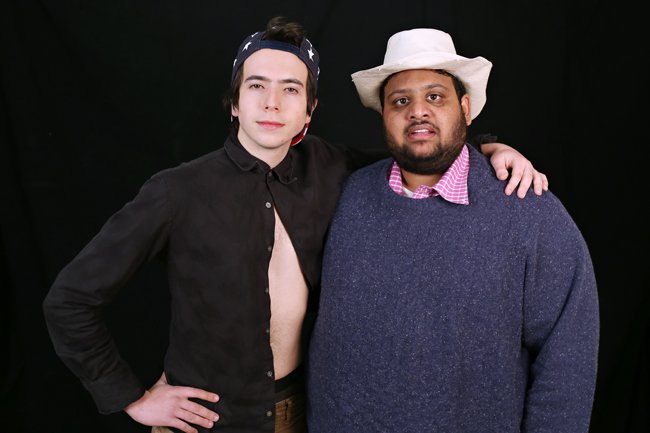Since 2009, the satirical University of Texas publication the Texas Travesty has submitted two of their members to run in the annual Student Government elections.
The pair pokes fun at the electoral process, mocking the pseudo-seriousness of an election that means little more than several impressive lines on the winners’ resumes.
This year as always, the Travesty campaign started as a joke: Xavier Rotnofsky and Rohit Mandalapu promised cellophane clothing to promote transparency and ran an attack ad against themselves. They promised an on-campus Chili’s and adopted “What Starts Here?” as their campaign slogan. Their comedic material quickly spread across social media, mustering enough laughs to capture 26.9 percent of the popular vote and forcing a runoff election. Their opponent was the Jones-Dargahi campaign, a duo that nearly captured 50 percent of the vote.
But with the possibility of elected office now dangling in front of them, RotMan got serious about their joke campaign. They continued pumping out self-deprecating propaganda, appealing to the closeted anarchist inside every college student.
They planned to tease voters to the polls by promising the political version of a kamikaze attack: electing candidates ironically.
Their Pied Piper approach worked, coaxing almost 10,000 votes out of the student body. More importantly, their antics and academic background awoke the sleeping giant of the voting demographic—GDIs. Usually, students in Greek life dominate Student Government elections. Neither Rotnofsky nor Mandalapu are involved in Greek life and used that fact to their advantage. They became the darlings of the niche Plan II community and appealed to independent students across the campus.
As one might expect, when Xavier Rotnofsky and Rohit Mandalapu were elected as President and Vice-President in May 2014, the national media began salivating. The story practically wrote itself: ‘Joke Campaign Wins Election.’ Texas Monthly, USA Today, and The Washington Post all covered the piece, as did The Dallas News, Huffington Post and Austin Statesman. The Alcalde wrote a detailed piece about the history of joke campaigns at UT, and the Laredo Morning News wrote about native Laredoan Rotnofsky that barely concealed its hometown pride.
Across the country, readers luxuriated in the familiar theme of quirky Austinites and their goofy hijinks. The pair took funny pictures to compliment the articles written about them that detailed their outlandish political platforms. At a time of intense national tension and political acrimony, RotMan’s David versus Goliath tale was mental comfort food, an elevated form of comic relief.
Then some interesting things happened. First, unprecedented rains bombarded central Texas for several months. On May 23rd torrential downpouring and the threat of lightning forced the University of Texas to cancel its official commencement for the first time in school history.
In response, discouraged but ambitious graduates began a grassroots movement to create an unofficial commencement the following night, using the hashtag #WhatStartsHereIsntStoppedByRain to coordinate the event.
Student Marshal Kistner created the “Class of 2015 Unofficial Student Commencement” Facebook page and invited more than 2,000 students to join. Efforts to get impromptu speakers such as Jimmy Kimmel, Ellen DeGeneres and Matthew McConaughey all failed, but in less than 24 hours organizers assembled more than 1,500 students, a live band and UT President Bill Powers to unofficially bid the graduates farewell.
The event was crowd-sourced, but Rotnofsky and Mandalapu played a large role in orchestrating and publicizing the impromptu celebration. Their connections through the Texas Travesty to the Facebook event’s creator, and their large social media wingspan increased the event’s publicity. They also worked with UT to arrange for logistical supplies, including diplomas, chairs and speakers.
Their involvement made the event a success and spurred national news coverage as a heartwarming tale of student ingenuity. For Rotnofsky and Mandalapu, the commencement marked the second time in months that the pair made national news—not bad for two joke candidates.
In their first test as President and Vice-President RotMan had succeeded remarkably, silencing critics who feared they lacked the capability to lead.
Then things got more serious. On June 17, Dylann Roof shot and killed nine members of a Bible study inside a historically black church in Charleston, South Carolina. During their campaign, Rotnofsky and Mandalapu had promised to remove the controversial statue of Confederate President Jefferson Davis that stands stood on UT campus. Though attention to that issue had waned, Roof’s act of terrorism suddenly thrust debate over the statue into the national spotlight. Rotnofsky and Mandalapu, found themselves in the national spotlight once again, this time in a position to make a decision that had massive and complex political implications.
They acted quickly: in less than a week after the shooting, the Student Government had drafted an official petition to remove the statue from campus. It quickly gathered more than 2,500 signatures, prompting new UT President Gregory L. Fenves to establish a committee of students, faculty and alumni to discuss the statue’s removal. On August 13th, Fenves announced the Davis statue would be relocated to the Dolph Briscoe Center, and on August 30, the statue was wrapped (in what appeared to be the cellophane of RotMan’s campaign promise) and moved from its position in the South Mall.
Rotnofsky and Mandalapu’s leadership accomplished something tricky and seldom-seen: they took popular discontent and channeled it into real results, forcing good to come from tragedy. To do so they navigated institutional racism, the schizophrenia of southern history and the complicated role of nostalgia in tradition. This kind of terrain routinely trips up professional politicians, let alone student ones.
Any single one of RotMan’s three massive successes: their election, impromptu commencement ceremony or removal of the Davis statue, could define a successful career for a student political duo. Instead, Rotnofsky and Mandalapu returned to campus eager to accomplish more. They may have been elected ironically, but Rotnofsky and Mandalapu have become two of the most impactful student leaders the campus has ever seen, as their track record proves. Looking back, their election seems less like a joke, and more like a stroke of luck.
It is important to remember, though, that despite all their successes, the most important thing about Xavier Rotnofsky and Rohit Mandalapu is that they are funny. A large part of RotMan’s success stems from dismantling the separation of joke and state. By bringing humor to their politics, they’re able to capture the attention of the flighty, unfocused demographic of student voters. Their comedy gives them a political agency that self-serious leaders can never have.










It’s actually “Texas Travesty,” not “The Travesty.”
[…] McCoy ended. Before you scoff, the RotMan comedy duo elected a few years ago ran on the promise to remove confederate statues and bring a Chili’s to campus. Can you eat your chicken crispers without a side of Confederacy? Yes, you […]